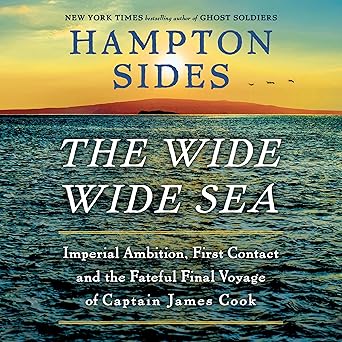
The story of James Cook’s third and final voyage is one of adventure, exploration, and tragedy. In 1776, Cook set off on his ship the HMS Resolution, never to return. Two-and-a-half years later, on a beach in Hawaii, Cook was killed in a conflict with native Hawaiians. But how did this come to be? Cook was a unique captain, renowned for his respect for Indigenous peoples and cultures. He was also a man of great curiosity, seeking to learn about the societies he encountered.
Cook's journey was one of great danger and continual effort. He was a master of the sea, and his crew looked up to him as a leader. On his previous expeditions, he had mapped huge swaths of the Pacific, including the east coast of Australia, and initiated first European contact with numerous peoples. He treated his crew well, and endeavored to learn about the societies he encountered with curiosity and without judgment. However, on his final voyage, Cook became increasingly mercurial. He resorted to the lash to enforce discipline, and led his two vessels into danger time and again. This was a departure from his usual character, and something within him had changed.
The tensions between Cook's overt and covert missions came to a head on the shores of Hawaii. His first landing there was harmonious, but when Cook returned after mapping the coast of the Pacific Northwest and Alaska, his exploitative treatment of the Hawaiians led to the fatal encounter. This moment marked the end of an era, and the beginning of a complex and controversial legacy that still debates to this day. Cook's legacy is a reminder of the complexities and consequences of the Age of Exploration. The story of his final voyage is both a thrilling narrative of adventure on the high seas and a searching examination of the human impact of exploration.
I recently finished reading a book that left me both fascinated and disturbed. The story of a famous explorer's final voyage is one of adventure, exploration, and tragedy. I couldn't help but think of my own grandfather, who was a sailor on a British ship during World War II. He told me stories of the vast oceans and the challenges of living on a small vessel with a crew of strangers. I was struck by the similarities between his experiences and those of the explorer, who was also driven by a sense of curiosity and a need to discover.
As I read the book, I found myself drawn into the world of the explorer, who was both a master of the sea and a complex, multifaceted person. He was known for his respect for Indigenous peoples and cultures, but also for his increasing mercurial behavior on his final voyage. I couldn't help but wonder what had happened, what had driven him to change so drastically. The tensions between his overt and covert missions came to a head on the shores of Hawaii, where his exploitative treatment of the Hawaiians led to a fatal encounter. This moment marked the end of an era, and the beginning of a complex and controversial legacy that still debates to this day.
The book is a thrilling narrative of adventure on the high seas, but it's also a searching examination of the human impact of exploration. I was struck by the parallels between the explorer's experiences and those of the people he encountered, who were struggling to maintain their cultures and ways of life in the face of European encroachment. The book is a reminder that even the most well-intentioned explorers can have unintended consequences, and that the legacy of colonialism and imperialism is still felt today. It's a book that will stay with me for a long time, and one that I would encourage anyone interested in history, exploration, or the human condition to read.
Rating: 2.9 / 5.0
This book is a thought-provoking and emotional journey that explores the complexities of exploration and colonialism. The story of James Cook's final voyage is a thrilling narrative of adventure on the high seas, but it's also a searching examination of the human impact of exploration.
The author masterfully weaves together historical facts with personal reflections, creating a narrative that is both engaging and thought-provoking. The protagonist's connection to the story is deeply personal, drawing on their own family history and experiences, which adds an extra layer of depth and emotion to the story.
As I turned the pages, I was struck by the parallels between the explorer's experiences and those of the people he encountered, who were struggling to maintain their cultures and ways of life in the face of European encroachment. I was also moved by the author's compassionate and empathetic portrayal of the explorer, who was both a master of the sea and a complex, multifaceted person.
The book is a powerful reminder that even the most well-intentioned explorers can have unintended consequences, and that the legacy of colonialism and imperialism is still felt today. It's a book that will stay with me for a long time, and one that I would encourage anyone interested in history, exploration, or the human condition to read.